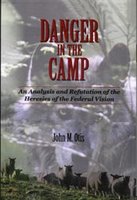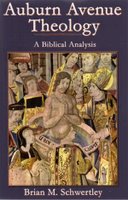There is much out there (especially on the net) and many pastors, let alone laymen, have little time to read all of it. I hope this is helpful (with unwitting help from Dr. Coppes who read the first two books and verbally summarized them to me):

1. The Justification Controversy, O. P. Robertson.
The very same author that brought us the popular "The Christ of the Covenants." If you want to read a book on the history of the controversy surrounding Norman Shepherd, than look no further than from a man who was right in the "thick of it." If you can make it through the historical detail and chronology (most of the book), you will find the summary of Shepherd's thinking most enlightening. This is only for those really wishing to find the history behind FV (who invited Shepherd to their Auburn conference).

2. Danger in the Camp, John Otis. This hard hitting book leaves no punches pulled. Using "no holds barred" approach to FV, Otis lays out in this thick tome a host of relevant full-length quotes (we're talking 1 full-page at times) from both FV proponants and confessional standards and authors of yesteryear. This is the type of book that will set the teeth of FVers and those sympathetic on edge.
3. Auburn Avenue Theology, Brian Schwertely. Originally
 Brian wrote several
Brian wrote severalarticles about FV. This book is apparently a collection of those, but one would not know this given its seamless nature. Although not as strong in his language as Otis, Schwertely deals directly with the key problems of FV. The book gives good, strong and extensive critiques of FV on covenant and justification as well as good, strong and extensive defenses of the orthodox views. His extensive treatment of the theological and exegetical necessity of the active obedience of Christ is worth the price by itself. This book is recommended for all laymen and pastors. He is to the point without being exasperating or strident in his analysis and critiques.
4. The Federal Vision & Covenant Theology, Guy Waters.

This is a companion volume to Waters' previous work, Justification and the New Perspectives in Paul. This is the book recommended by all the scholars. It is written for scholars (although he tries to write for laymen) and it is for scholars. That is, he is not as "straight up" (i.e the difference between saying "that's wrong" and "that is incompatible with our belief system") as say Otis nor as direct as Schwertely, but he makes up for that in his steady momentum throughout the book. It has the largest bibliography, especially garnering resources off the net, showing some incredible quotes not found in the other books (Dr. Coppes has not seen them there either). This book supplements Schwertely by supplying more nuanced analysis and useful quotes and observations. It is recommended for those really wanting to "cover all the bases."
In short order, Lord willing, I will collect the more useful information out of Waters' book (especially since I can link them from the net) for everyone out there. And hopefully a useful introduction to the FV will be forthcoming. The issue is surprising complex for many a laymen. As an educated layman queried professor Strange at our conference: "how can they have losable baptismal regeneration and believe in eternal election at the same time?" He, being well trained by his pastors over the years, could not conceive of such a hodgepodge theology. Indeed, many in the pew could not have either. But, then, these views did not arise from the bottom-up, but rolled down hill from the pulpits.
SDG
No comments:
Post a Comment